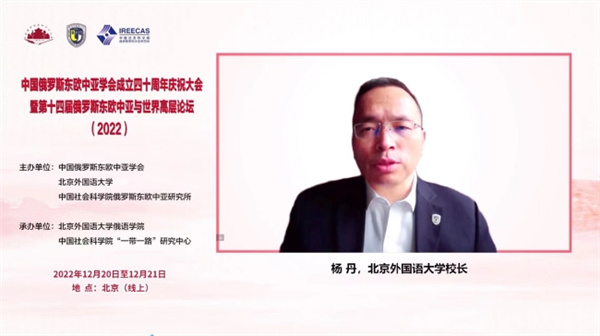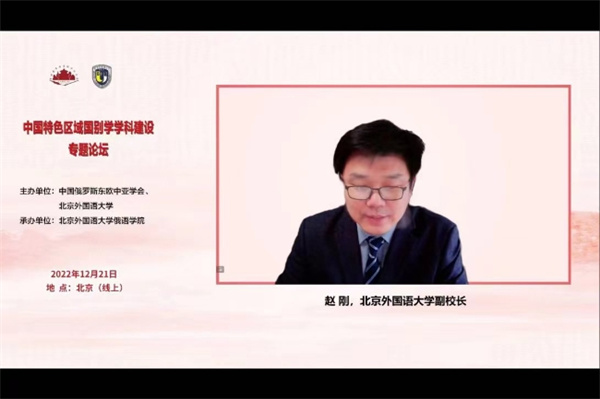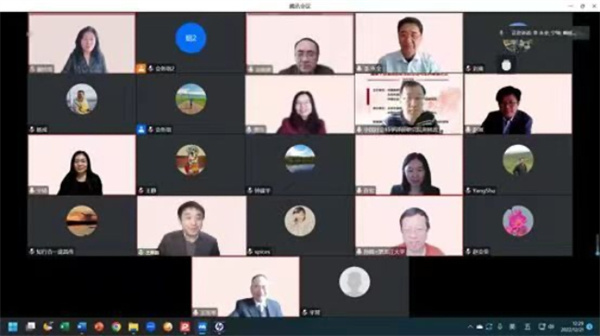- Research
- Research Centers
- Journals
- Admission
- Introduction
- Programs
- Application
- Alumni & Giving
- Alumni Club
- Giving
The 14th High-level Forum on Russia, Eastern Europe, Central Asia and the World was held online from Dec 20 to 21.
Jointly hosted by Beijing Foreign Studies University (BFSU), the Chinese Association for Russian, East European and Central Asian Studies and the Institute of Russian, East European and Central Asian Studies at the Chinese Academy of Sciences, the forum attracted nearly 280 scholars from across the country.

Yang Dan, president of BFSU and deputy secretary of the CPC BFSU committee, addresses the opening ceremony of the forum. [Photo/bfsu.edu.cn]
Yang Dan, president of BFSU and deputy secretary of the CPC BFSU committee, congratulated the Chinese Association for Russian, East European and Central Asian Studies on its 40th anniversary and highly recognized the contributions made by the association in academic research.
Yang underscored the significance of country and area studies, saying that Russia and countries in Eastern Europe and Central Asia are important participants in China's Belt and Road Initiative, as well as vital partners in mutually beneficial cooperation and peaceful development of Asian and European countries.
As country and area studies have been rated as a first-tier discipline, building China's independent knowledge system of the discipline has become a new task for Chinese scholars, Yang noted, adding that the Chinese path to modernization has served as a driving force for the development of relevant research.
Yang called on professionals in the field to refine the connotations, denotations, conceptual systems, paradigms and methods of country and area studies based on interdisciplinary integration, highlight the improvement of knowledge and ability of languages, academic domains and cognition of countries and regions in talent training, and build a new ecology for the development of China's country and area studies.

Zhao Gang, a member of the standing committee of the CPC BFSU committee and vice-president of the university, delivers a speech at the special forum on disciplinary construction of country and area studies with Chinese characteristics. [Photo/bfsu.edu.cn]
Zhao Gang, a member of the standing committee of the CPC BFSU committee and vice-president of the university, gave a speech at the special forum on disciplinary construction of country and area studies with Chinese characteristics.
Zhao said that disciplinary construction has been put on the agenda following the designation of country and area studies as a first-tier discipline, and that building a discipline system with Chinese characteristics is of practical significance for the future development of this emerging subject, as well as for facilitating the country's international academic discourse.
Zhao made special mention of BFSU’s disciplinary development, academic exchange platforms and new achievements made in the disciplinary building of country and area studies. He welcomed fellow researchers to actively participate in activities organized by the university’s Consortium for Country and Area Studies to provide intellectual support for the progress of the discipline and the construction of China’s Belt and Road Initiative.

Experts and scholars participate in the 14th High-level Forum on Russia, Eastern Europe, Central Asia and the World via video link. [Photo/bfsu.edu.cn]
In their keynote speeches titled “Traditional Disciplines, Country and Area Studies and Interdisciplinary Identities” and “Talent Training and Disciplinary Construction of Russian Studies in Chinese Universities”, Wang Zhanpeng, deputy director of the Academy of Regional and Global Governance at BFSU, and Dai Guiju, dean of the School of Russian at the university, expounded on the relationship between traditional disciplines, such as foreign language and literature, world history, political history, politics, law, communication, anthropology and management, and the inter-discipline of country and area studies, and highlighted the key points for Chinese universities in training talents in Russian studies, and the necessity and urgency of multilingual and inter-disciplinary talent cultivation.